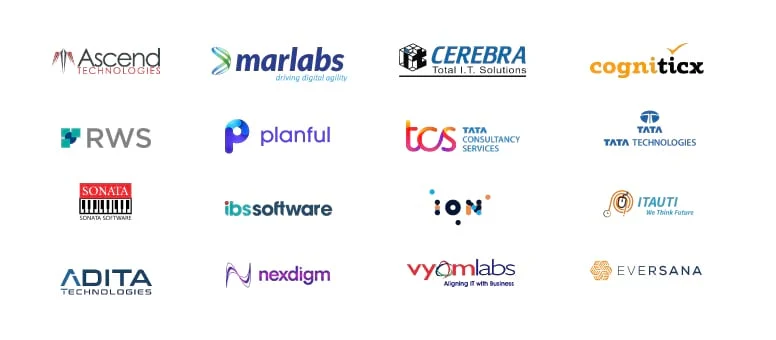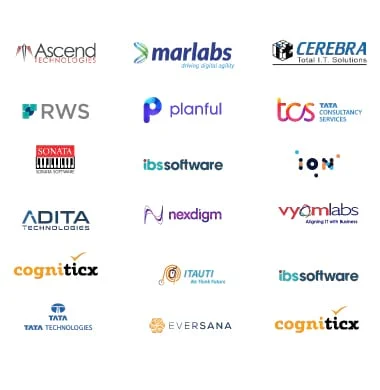30+ Hrs
Hands On Training
Lifetime Access
Updated Content
Customizable
Learning Paths
Industry Expert
Mentors
Projects
Advanced Interactive

Hands On Training
Updated Content
Learning Paths
Mentors
Advanced Interactive
DevOps is a set of cultural concepts, practices, and technologies that improves an organization's capacity to produce high-velocity applications and services, allowing it to evolve and improve products at a faster rate than traditional software development and infrastructure management methods.
HKR training, a leading DevOps training center in Delhi, India, provides thorough and in-depth DevOps training. You'll work on real-world DevOps projects that will help you learn DevOps continuous integration, continuous delivery, and continuous deployment strategies, as well as automating essential server deployment, code testing, and other procedures.You will also work on real time projects to gain practical exposure to the subject. Become a Devops expert by enrolling in our Devops certification training in Delhi today!
To apply for the Devops Training in Delhi, you need to either:
Our Devops course curriculum is curated with the help of Devops experts to simplify the concepts of Devops. So we would cover every concept related to Devops and keep you updated. Following are the list of modules that would be covered in your Devops Training in Delhi:
1.1 What is DevOps?
1.2 The 10,000 foot view
1.3 Why DevOps?
1.4 Dev-Test-Deploy
1.5 DevOps Principles
1.6 DevOps Toolchain
1.7 Overview of DevOps Tools
1.8 Co-relation between Agile and DevOps
1.9 Categories of DevOps Tools
2.1 Objective
2.2 What is SCM
2.3 Git branching and merging
2.4 Git Overview
2.5 Creating pull request
2.6 Code Review
2.7 Merging changes
2.8 Assisted Practice: Create a repo and push code on GitHub / Bitbucket
2.9 Advanced topic
3.1 Objective
3.2 Container Concept
3.3 Container Vs Virtual Machine
3.4 Installing docker on Centos, Debian and Windows
3.5 Managing Container with Docker Commands
3.6 Docker Compose
3.7 Docker registry - Docker Hub
3.8 Networking inside a single docker container
3.9 Networking across container and platform
3.10 Assisted Practice 1: Running a container Image with Docker
3.11 Assisted Practice 2: Building own docker image
4.1 Objective
4.2 Overview of Kubernetes, Docker Swarm and Consul
4.3 Kubernetes - Architecture and functional component
4.4 Installing Kubernetes on VM
4.5 Configure Pods and Containers
4.6 Kubernetes - Cluster Administrator Tasks
4.7 Kubernetes - App Developer Tasks
4.8 Running application on Kubernetes cluster
4.9 Scaling app in the cluster using the rolling update
4.10 Services, Load Balancing, and Networking
4.11 Security and Configuration
4.12 Running Automated Tasks with a CronJob
4.13 Stateful set to manage apps
4.14 Managing and using storage in pod and cluster level
4.15 Continuous deployment of an app from a git repository
4.16 Horizontal Pod Autoscaler
5.1 Objective
5.2 Configuration Management Tools in DevOps
5.3 Ansible fundamental
5.4 Ansible installation and version
5.5 Single command execution using ansible
5.6 Roles and ansible-galaxy
5.7 Playbook and jinja2 template
5.8 Debugging and Troubleshooting
6.1 Objective
6.2 Infra as a Code
6.3 Terraform Initialisation
6.4 Terraform provider, variable, resource group
6.5 Creating VM in AWS using terraform code
6.6 Creating and using Terraform Module
6.7 Version control of Terraform Code
7.1 Objective
7.2 Jenkins Installation
7.3 Run Jenkins Job
7.4 Jenkins Job to copy build on deployment VM
7.5 Jenkins job to deploy on Docker container
7.6 Jenkins job to deploy on Kubernetes
8.1 Objective
8.2 Introduction to Continuous Monitoring
8.3 Introduction to Graffana
8.4 Installing Graffana
8.5 Adding customised dashboard in Graffana
9.1 Objective
9.2 Introduction to AWS
9.3 Devops using AWS service
9.4 Kubernetes on AWS
9.5 Docker on AWS
9.6 Various AWS services - EC2, S3, VPC, Subnet, IAM
Description:In this project, we will create the CI/CD pipeline and integrate various devops tools like git, docker, selenium and p.....uppet. Read more
Description:In this project you will learn the importance of merging branches in the git by implementing a production usecase.You .....will also learn about the usage of git workflows, etc. Read more


Following are some of the objectives that you can achieve in your Devops training:
Our Data Marketing certification is intended for professionals with or without professional experience in one of the following profiles:
There are no particular prerequisites for attending this Devops course. Any person interested in building their career in Devops can take up this course.
You can enquire about the right platform that would give you complete knowledge. One such platform is HKR trainings. We provide you with excellent support for Devops training by illustrating real-time scenarios and use cases. And help you to build your career in the field of Devops.
When you complete this Devops course, HKR trainings will issue you the course completion certificate for Devops. This certificate will help you to get your desired job opportunity.
At HKR trainings, our Devops trainers are highly qualified and certified with numerous years of industrial experience and technological training.
We do not provide any job, but we give complete guidance throughout your course and assist you in clearing your interview. But your job will be based on your performance in your interview.
After getting DevOps Training and certification, you will have multiple job opportunities in Delhi and other cities. You will get various profiles like DevOps Engineer, Cloud DevOps Engineer, and many more. These job profiles are based on the companies and their requirements.
With the digitization of companies, the need for DevOps professionals is also increasing. There are promising career opportunities for DevOps-certified people in the cities like Delhi. Many companies are now adopting DevOps methodologies to improve themselves with the changing trends. Also, Delhi is a hub for many tech giants, so there will be many opportunities.
DevOps is the combination of two words: Development and Operations. It combines the tasks related to the development of applications or services with the Operations tasks to increase the ability of the organization to deliver the application or service quickly.
DevOps is not very difficult to learn. DevOps is full of learning opportunities and difficulties; it requires not only technical expertise but also a solid knowledge of both business requirements and complex technical issues. There are a lot of tools and technologies in DevOps, like Maven, Jerkins, Docker, AWS, etc. You will be applying these tools and technologies to implement real-time scenarios.
Every class is recorded. If you have missed your class, you can learn those concepts from the recorded sessions of the missed class. So, No worries!
Yes! Right from the first day of your DevOps training, our trainers make sure that you understand all the concepts and provide you with complete guidance to reach your dream job. And when you complete your course, we will also assist you in your resume preparation which will give you the confidence to clear your interview. Moreover, We are also tied up with some corporate companies. So when they have a requirement, we send your profiles to them.
At HKR, we provide a free demo session for training seekers so they can check our quality and method of education before they enroll.
You can contact our customer care number if your query does not belong to any of the questions we have addressed in this article. We will get back to you as soon as possible.
HKR Trainings assures that the learners get a quality course from our trainers. You (the learners) will have lifetime access to recorded sessions. So in case of any doubts, you can watch these recorded sessions or even can ask your trainers to clarify them. Moreover, you will also be working on a real-time project which will help you understand the concepts more clearly. So there is no question of not being satisfied.
The cost of DevOps certification depends upon the mode of DevOps Training you take. However, the price varies with different learning modes like self-paced and live online training. You can choose from the options of training modes available.
HKR Training offers multiple DevOps certifications like DevOps Training, AWS DevOps Certification, etc. You can easily choose one of these best courses. If you have any confusion in selecting the best study, then you can take the support of the team.
For Assistance Contact:
![]()
![]() +91 9711699759
+91 9711699759
Query